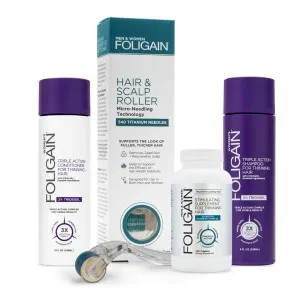Reasons For Hair Loss In Women
Female Pattern Hair Loss
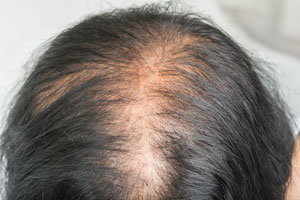
It’s thought over half of women over the age of 65 experience female pattern baldness, so if you're struggling with female hair loss you aren’t alone. There are scientific breakthroughs and modern products that can help you fight back against hair loss so you don’t have to accept what nature has provided, hair loss treatments can help you re-grow and keep a healthy head of hair.
It’s normal to lose up to 50-100 hairs from your head every day but when these aren't replaced hair loss can occur. Most of us have heard of male pattern baldness and have certainly seen it in male family members or work colleagues but women can experience a similar form of hair loss. Female pattern baldness isn't well understood but it may be inherited and unfortunately it’s a common cause of hair loss in older women. Generally women experience a thinning of head hair across the whole scalp rather than the balding crown and hairline developed by men. This all over thinning exposes the scalp beneath and gives the impression of baldness which is upsetting and can cause a lack of self esteem.
Dandruff
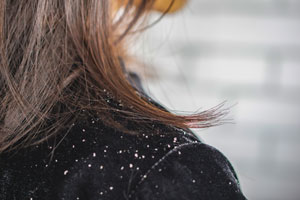
The small, white flakes most of us see in our hair called Dandruff are nothing but dead skin. Apart from hair, they can be noticeable on someone’s clothing. The causes of dandruff are still not clear but some studies show that it could be due to a type of fungus or an irritation. There are even myths about dandruff being contagious or dangerous, which isn't true. Hair care solutions containing salicylic acid, zinc, tars, or selenium sulfide can be useful to reduce dandruff flakes. Also while shampooing, massage your scalp for at least 5 minutes with your fingers but don't scratch.
Menopause
Many women approaching menopause will experience thinning hair and although this usually occurs in their 50s it can happen earlier to younger women. Hormones support hair growth and when a decrease in the hormone oestrogen takes place your hair is affected too. Women in peri-menopause can experience dry, thinning hair before hair loss occurs so it’s time to act if your hair is thinning.
Medical Conditions
Diabetes, anaemia, thyroid disease and autoimmune diseases can cause hair loss in women and men. Skin complaints such as ringworm, psoriasis and eczema can also cause patchy hair loss and polycystic ovary syndrome can create thinning hair that easily breaks so if you have sudden thinning and hair loss it's worth seeing your doctor to ensure you're in good health.
Stress or Trauma

Sudden stress or upset can cause hair shedding. Events like a bereavement or sudden shock through to high fevers can result in hair loss and long term stress will have the same effects although this form may appear as a gradual hair loss. Hair lost through stress will often grow back but may persist if the stress is ongoing.
What Causes Hair Loss In Women?
Hair suffers when our diets are low quality because women need protein, iron, vitamin D and calcium to make strong hair. Simply taking a multivitamin isn't the right strategy to tackle hair loss and the best bet is to overhaul your diet. Start eating more lean meat or tofu, leafy greens, fruit, dairy produce and beans. Water is essential too so it’s important to keep topped up with 8 glasses a day. Eating well and drinking more water will help hair loss because when nutrients are in short supply your body uses them to support vital functions like the heart, brain and kidneys and so there's nothing left over for hair growth.
It's often the case that the earlier you start to tackle problems such as receding hairlines, thinning hair or hair loss with natural hair care products, the better and more effective the results you should be able to see. This is because you give the best possible opportunity to help stimulate healthy hair growth as the hair follicle is only just beginning to be affected by DHT (Dihydrotestosterone), which is in many cases the cause of hair loss.
Hair Regrowth Without Unwanted Side Effects
If your confidence is at an all-time low and you need a quick fix, you could consider a hair transplant. However, this method can be expensive, uncomfortable and risky, with many people finding that the results weren't what they had anticipated and regularly need to attend top up treatments, which also means further costs. With that in mind, ShytoBuy offers a variety of all-natural, cost-effective natural hair care products aimed at tackling the problem of hair loss safely, discreetly and naturally. Not only are many of them created by renowned brands, known for their effective products and easy applications – they all allow you to improve the appearance of your hair in the privacy of your own home.
Excessive bleaching, styling, perms and straightening can also lead to hair loss, so, if you have regular harsh treatments, cut back and let your hair recover. Try to avoid harsh styling too because anything that places tension on your scalp causes hair loss. Ponytails, buns, braids and cornrows create tension that pulls out hair so try a relaxed soft style to cut back on the amount of hair loss you experience.
How To Stop Hair Loss
There are no prescription medicines available for women’s hair loss but you may have heard of a prescription hair loss medication designed for men. This works by targeting testosterone that converts into DHT and damages the follicles but women don’t have the same physiology so the drug won’t work for them. There are over-the-counter hair loss remedies available called vasodilators but these come with the risk of side effects and aren’t suitable for all women. Tread carefully if you use medicines for hair loss and consult your doctor or pharmacist first.
If you have sudden hair loss or extreme hair loss it's worth speaking to your GP for a check up and to make sure your hormones and general health are top notch. If you have an underlying health condition, getting back on track may solve your thinning hair problems. Once your doctor has given you the all clear, you'll need to start taking steps to prevent hair loss and regrow what's missing. Your hair will need help to achieve regrowth but a change of lifestyle and the best hair loss products will boost your chances of regaining a full healthy head of hair
How To Prevent Hair Loss
Shampoos
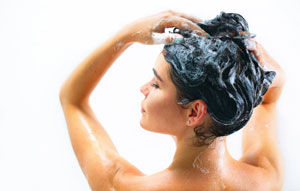
Hair loss shampoos promote healthy follicles, thick hair and fight against hair loss in women. Caffeine shampoos help to stimulate the follicles which are more likely to grow new hairs and anti-dandruff shampoos can also help fight hair loss by reducing any blockages on your scalp. A clean, healthy scalp that’s free from sebum and dirt gives your hair a better chance of growing thickly and evenly.
Hair loss thickening shampoos are very easy to use and a popular treatment for hair loss in women too. These bulk up what you already have and boost your locks with nutrients specifically designed for hair loss.
Hair Loss Tablets & Capsules

Hair loss supplements are available as hair loss pills or hair loss capsules and they aid hair growth by replenishing the scalp with the nutrients needed to prevent hair loss. Supplements fight against female pattern baldness and support the appearance of thick, full hair. Hair loss pills are different from standard multivitamins because they contain natural vitamins, minerals and herbs that are specifically targeted at women’s hair health.
Topical Treatments
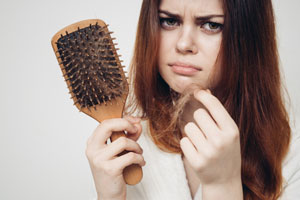
Topical treatments may boost circulation and increase the metabolism of hair follicles. Vitamins, minerals, growth compounds and herbs help remove built up sebum and infuse the scalp with nutrients that increase the hair’s blood supply. Topical treatments are popular hair loss products because they're easy to use and get results by treating the follicles.
Low Level Light Therapy (LLLT)
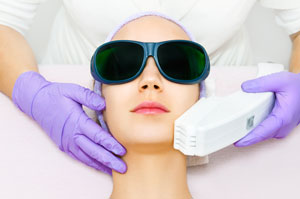
Light therapy light therapy for hair is worth considering if you're suffering from hair loss as it’s been shown to stimulate hair follicles at the roots to improve cellular activity that promotes new, thicker hair growth. You can try low level light therapy at home with a laser helmet that applies low level light therapy to the entire scalp. This can lead to thicker hair growth and prevent hair loss by promoting cellular activity at the source of the problem. Laser helmets and laser combs provide LLLT and they're easy to use tools that can be altered to suit your specific needs.
Surgery
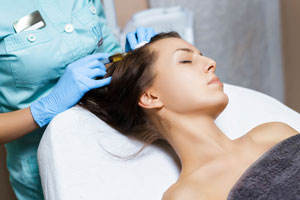
A hair transplant is a surgical procedure that takes healthy follicles and grafts them to areas of baldness on the scalp. It's a more commonly used procedure for hair loss in men than women and it can be successful but hair loss transplants are expensive and come with all the risks of surgery.
Wigs
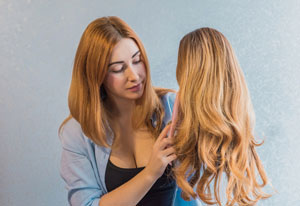
Wigs are the traditional way to treat hair loss in women and modern methods have combined to make natural wigs that are hard to distinguish from real hair. If you’ve lost half of your hair from an illness the NHS will provide a wig, but you can buy them privately too. Wigs provide immediate relief from hair loss and you can use one whilst you try out hair loss remedies to regrow your hair.
What Can Cause Hair Loss?
Unfortunately hair loss is usually caused by genetics and the ageing process so unless you're unwell, stressed, have suffered a big shock or you’ve been eating very poorly it’s most likely the natural process of ageing that’s caused your hair loss. Hair loss might be natural, but that doesn’t mean you can’t treat it and restore your crowning glory. If you have a clean bill of health you can use hair loss treatments to help stimulate follicles and boost hair regrowth.
Hair loss is a commonly accepted result of aging in men but when it affects women the psychological effects can be devastating. Hair loss can lead to rock bottom self-esteem, a dislike of your appearance and withdrawal from social life. These unwelcome psychological aspects of female hair loss can lead to depression and anxiety in some - if you feel this way speak to a professional and join a hair loss forum. You're not alone in feeling unhappy about hair loss because many women suffer its devastating effects.
However, there are lots of hair loss treatments to try so look around for the best one to suit your lifestyle. If you're short on time, a hair loss tablet might suit you better than a topical treatment but, if you like being pampered, shampoos and natural topical treatments may appeal to you instead. Choose a hair loss treatment regime you can stick to and keep going because we’ve all had that bad haircut we needed to grow out and know that hair growth takes time. Regularly using the best hair loss treatments can help a great deal along with eating well, drinking water and being gentle with your locks.
Hair loss in women is common so don’t feel alone, take some steps to improve your hair health and boost your self confidence.
